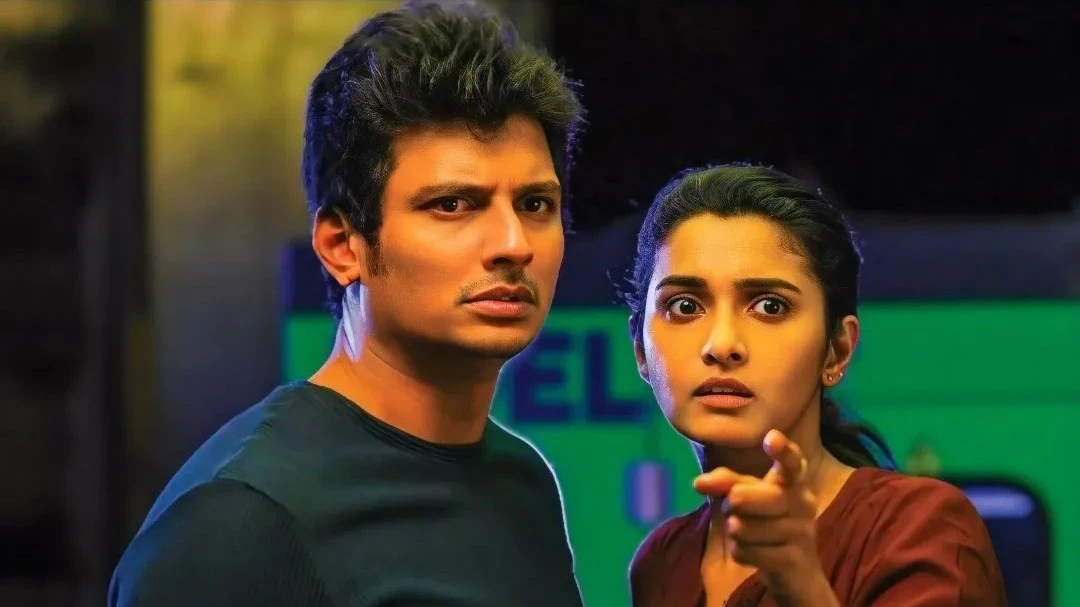The success of the film is that it grips you and doesn’t let you go. There’s no horror or terror. But there’s suspense. The rest of this review may contain spoilers…
Black opens in the past. There’s a broken love triangle, with one of the people involved still holding a grudge. There’s a car travelling through a night lit by a huge moon. There’s a statue of some kind of Christian god or angel. There are flickering lights. And most importantly, there is a passage of darkness. It’s not a tunnel, exactly. It looks as though the street lights went out in just one section of the road, because on either end of this passage, there’s light. KG Balasubramani’s debut feature is high on atmosphere. Yes, there is a silly, time-wasting hero-heroine song, with Jiiva and Priya Bhavani Shankar in the present day. Yes, there’s a club scene that could have been handled better, given that it is basically a red herring. But mostly, this is a film that is spot on in terms of camerawork and colour scheme and (for this genre) a refreshingly subdued score by Sam CS.
But what, exactly, is the genre? The writer-director toys with us. Is it a murder mystery set in the past, about who killed a couple? Is it a story set in the present day about a missing wife? For a very brief while, I even wondered if there might be some reincarnation stuff going on. Or is it one of those psychological films where we realise “it is all a dream”, thanks to the consumption of a powerful drug? But the big moon appears again, and we are slowly left to see how that big moon from the opening scenes connects to this one. Maybe it has something to do with déjà vu! The success of Black is that it grips you and doesn’t let you go. There’s no horror or terror. But there’s suspense. There are some thrillers in which the audience knows what’s going on and the characters don’t. Here, everyone’s kept in the darkness: the darkness suggested by the title.

Jiiva plays Vasanth and Priya Bhavani Shankar plays Aranya. They’re a couple, and they decide to spend time in a posh villa that they own. Small problem: no one else has moved into the complex, so they are alone. And like most movies where the characters are alone, there’s a sense of haunting. Is it a ghost? Is it someone else who’s secretly moved into this villa complex? After a bit of a shaky start, the film begins to unleash sequence after interesting sequence. One of these sequences involves a letter. Another one involves Vasanth and some very good visual effects work. A third sequence involves evidence that someone may have been watching. And a loop develops. The same thing seems to be happening, but in variations. Vasanth and Aranya do something. Something gets done to Vasanth and Aranya. Again, Vasanth and Aranya do something. Again, something gets done to Vasanth and Aranya. They are both the actors and the acted upon.
At one point, Aranya says she doesn’t know what is happening: “Ayyo, enakku sathiyama onnum puriyala.” For a while, we feel that way – and that’s a good thing. Watching the movie, I was impressed by the clarity with which this complex story had been told, without being dumbed down. Later, I learnt that the screenplay is based on a 2013 film called Coherence, but a casual read of the Wiki synopsis reveals that this is not the same movie. After the big reveal, we see that the explanation behind these events is actually very simple. But that, again, is the film’s success. It has taken a one-line plot and fleshed it out very convincingly. I did not understand what the statue had to do with all this, but I didn’t mind. The bulk of Black works. And it’s less than two hours. That’s a win-win.


